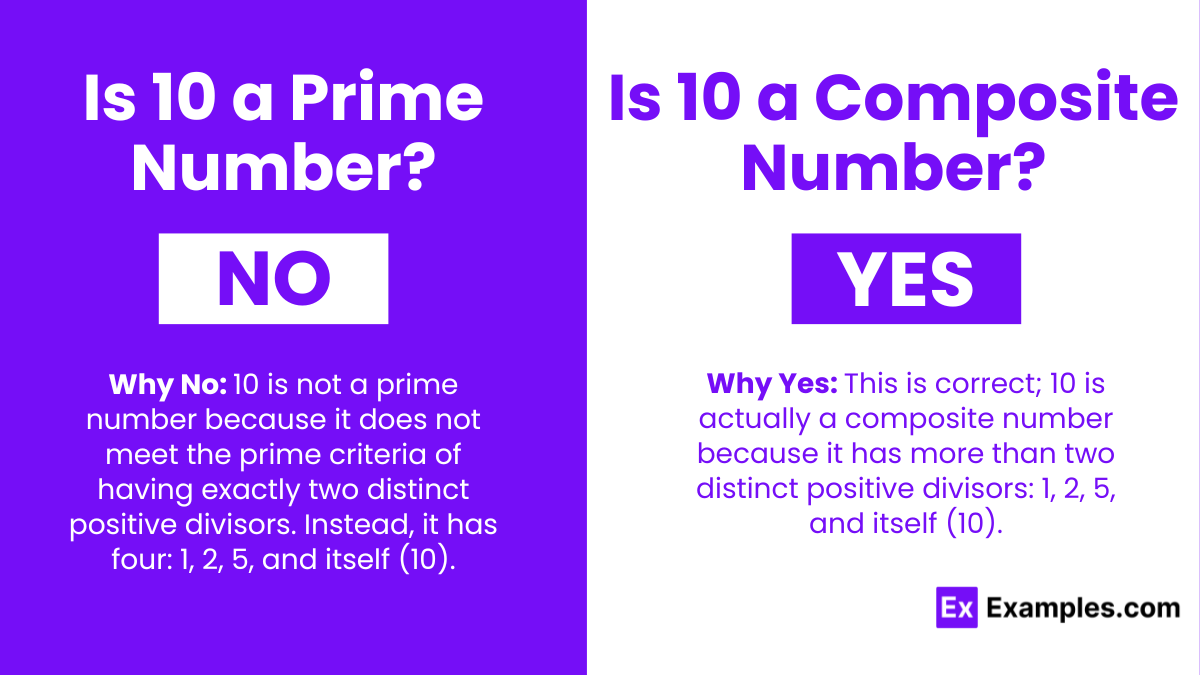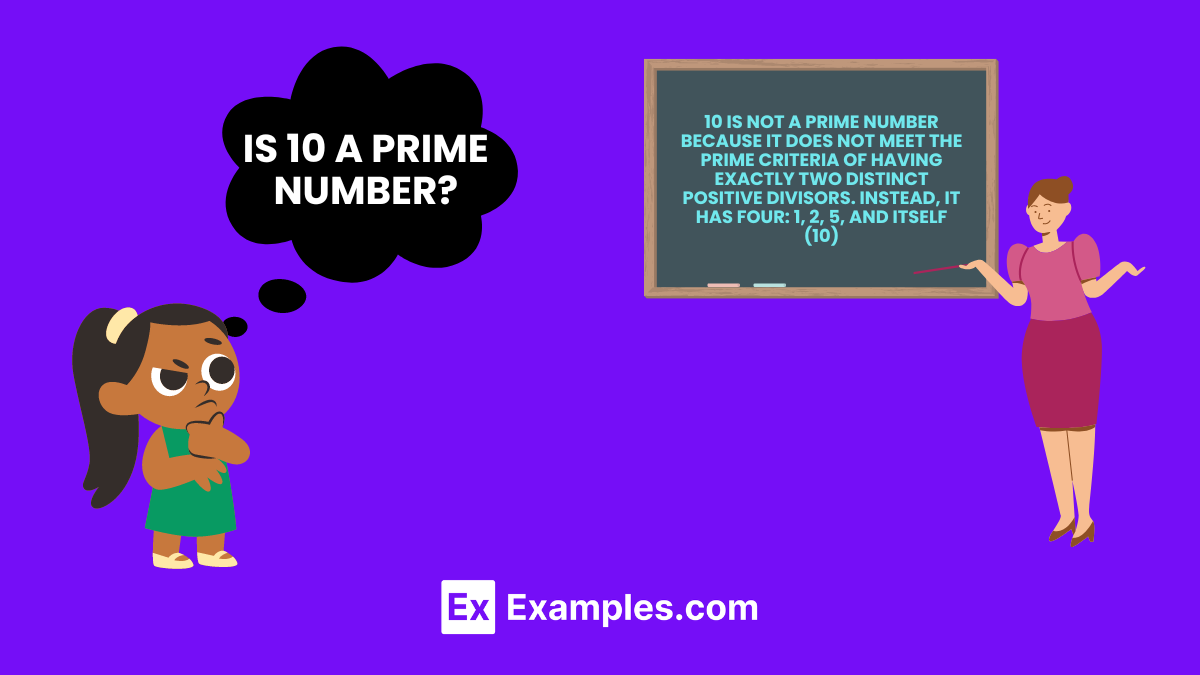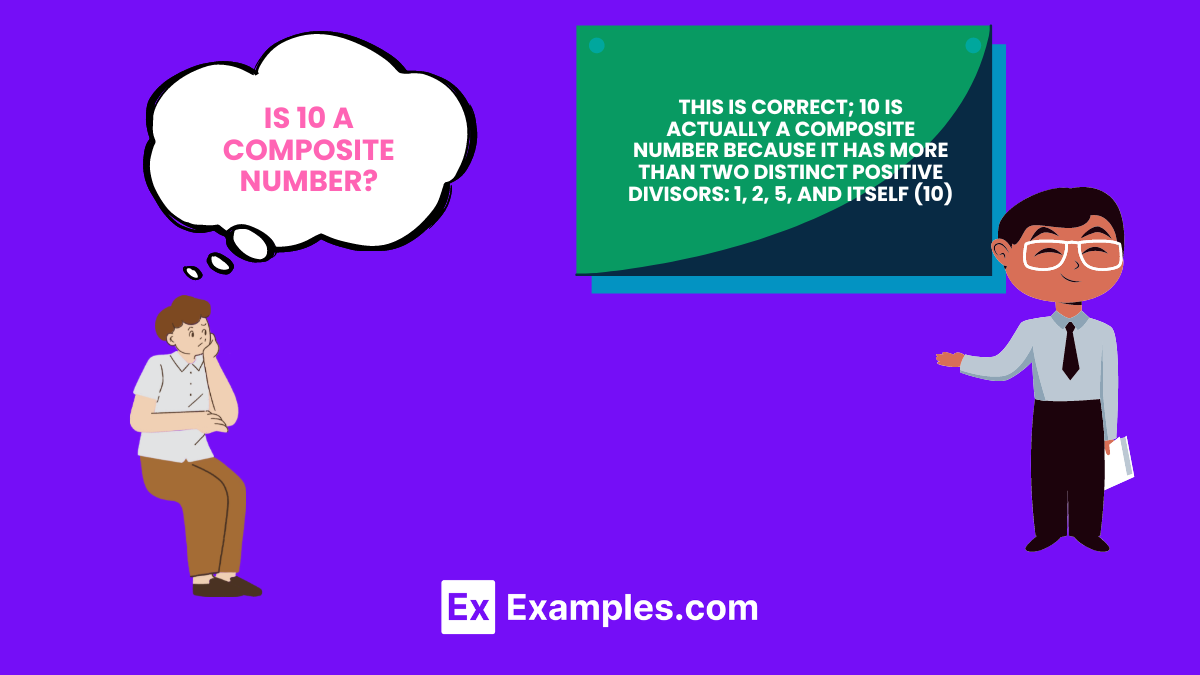Is 10 a prime number or a composite number?
Prime
Composite
Neither
Both


No – 10 is not a prime number.
Why No: 10 is not a prime number because it does not meet the prime criteria of having exactly two distinct positive divisors. See Prime number checker

YES – 10 is a Composite Number
Why Yes: This is correct; 10 is actually a composite number because it has more than two distinct positive divisors: 1, 2, 5, and itself (10).

| Property | Answer |
|---|---|
| Is 10 a prime number? | No |
| Is 10 a composite number? | Yes |
| Is 10 a perfect square? | No |
| Factors of 10 | 1, 2, 5, 10 |
| Multiples of 10 | 10, 20, 30, 40, 50, 60, 70, 80, 90, 100 |
| Cube Root of 10 | 2.15 |
| Square of 10 | 100 |
| Square Root of 10 | 3.16 |
| Is 10 a Perfect Square? | No |
| Is 10 a Perfect Cube? | No |
| Is 10 an Irrational number | No |
| Is 10 a Rational number | Yes |
| Is 10 a Real number | Yes |
| Is 10 an Integer | Yes |
| Is 10 a Natural number | Yes |
| Is 10 a Whole number | Yes |
| Is 10 an Even or odd number | Yes (10 is an even number) |
| Is 10 an Ordinal number | Yes |
| Is 10 a Complex number | Yes (as all real numbers are also complex numbers) |
The factors of 10 are 1, 2, 5, and 10. 10 is not a square number, but it is divisible by more than just 1 and itself, indicating its composite nature. There are no more factors of 10 beyond these.
10 is recognized as a composite number because it has more than two divisors: 1, 2, 5, and itself (10). This characteristic distinguishes it from prime numbers, which are only divisible by 1 and themselves. The number 10, being the base of the decimal system, holds a foundational place in mathematics and daily life. Additionally, in various cultures around the world, 10 symbolizes completeness and the foundation of many counting systems, reflecting its central role in numerical and conceptual frameworks.
Composite numbers from 10 include 10, 12, 14, 15, 16, 18, 20, etc., being numbers with more than two factors.
<h2
What are 10 prime numbers?
Ten prime numbers are 2, 3, 5, 7, 11, 13, 17, 19, 23, 29, representing numbers with only two distinct positive divisors.

No – 10 is not a prime number.
Why No: 10 is not a prime number because it does not meet the prime criteria of having exactly two distinct positive divisors. See Prime number checker

YES – 10 is a Composite Number
Why Yes: This is correct; 10 is actually a composite number because it has more than two distinct positive divisors: 1, 2, 5, and itself (10).

Property | Answer |
|---|---|
Is 10 a prime number? | No |
Is 10 a composite number? | Yes |
Is 10 a perfect square? | No |
Factors of 10 | 1, 2, 5, 10 |
Multiples of 10 | 10, 20, 30, 40, 50, 60, 70, 80, 90, 100 |
Cube Root of 10 | 2.15 |
Square of 10 | 100 |
Square Root of 10 | 3.16 |
Is 10 a Perfect Square? | No |
Is 10 a Perfect Cube? | No |
Is 10 an Irrational number | No |
Is 10 a Rational number | Yes |
Is 10 a Real number | Yes |
Is 10 an Integer | Yes |
Is 10 a Natural number | Yes |
Is 10 a Whole number | Yes |
Is 10 an Even or odd number | Yes (10 is an even number) |
Is 10 an Ordinal number | Yes |
Is 10 a Complex number | Yes (as all real numbers are also complex numbers) |
The factors of 10 are 1, 2, 5, and 10. 10 is not a square number, but it is divisible by more than just 1 and itself, indicating its composite nature. There are no more factors of 10 beyond these.
The factors of 10 are 1, 2, 5, and 10.
10 is a composite number.
10 is not one of the odd prime numbers; it is an even number.
10 is considered a significant number in various cultures.
10 is a natural number.
10 is a positive integer.
10 is a composite number.
10 is an even number.
10 is a rational number.
10 is a whole number.
10 is recognized as a composite number because it has more than two divisors: 1, 2, 5, and itself (10). This characteristic distinguishes it from prime numbers, which are only divisible by 1 and themselves. The number 10, being the base of the decimal system, holds a foundational place in mathematics and daily life. Additionally, in various cultures around the world, 10 symbolizes completeness and the foundation of many counting systems, reflecting its central role in numerical and conceptual frameworks.
Composite numbers from 10 include 10, 12, 14, 15, 16, 18, 20, etc., being numbers with more than two factors.
<h2
What are 10 prime numbers?
Ten prime numbers are 2, 3, 5, 7, 11, 13, 17, 19, 23, 29, representing numbers with only two distinct positive divisors.
Text prompt
Add Tone
10 Examples of Public speaking
20 Examples of Gas lighting
Is 10 a prime number or a composite number?
Prime
Composite
Neither
Both
Which of the following best describes the number 10?
Prime
Composite
Neither
Both
How would you classify the number 10?
Prime
Composite
Neither
Both
Determine if 10 is a prime or composite number.
Prime
Composite
Neither
Both
Is the number 10 a prime number?
Yes
No
Maybe
Can't determine
Which statement is correct about the number 10?
It is a prime number because it is divisible by only two numbers.
It is a composite number because it has more than two divisors.
It is neither prime nor composite.
It is both prime and composite.
What category does the number 10 fall into?
Prime
Composite
Both
Neither
Can the number 10 be classified as a prime number?
Yes, because it only has two divisors.
No, because it has more than two divisors.
Yes, because it is an even number.
No, because it is an odd number.
Is 10 considered a composite number?
Yes, because it is divisible by numbers other than 1 and itself.
No, because it is only divisible by 1 and itself.
Yes, because it is an odd number.
No, because it is a prime number.
Determine if 10 is a prime or composite number.
Prime
Composite
Neither
Both
Before you leave, take our quick quiz to enhance your learning!

